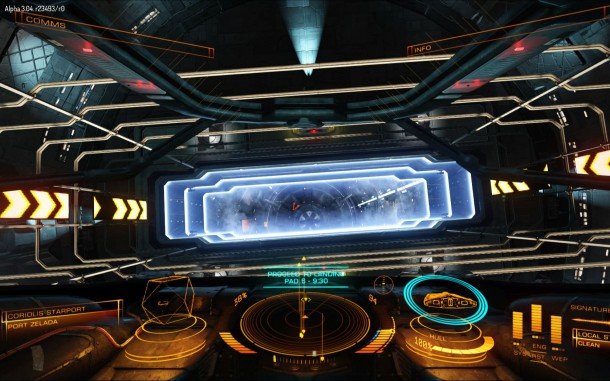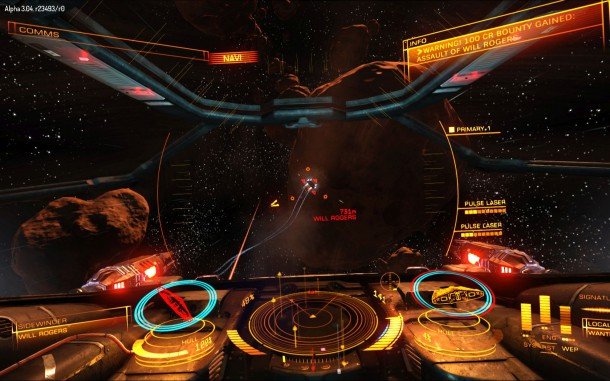Elite: Dangerous preview - chasing a deep space goldrush in Frontier's dynamic galaxy

There are over 100 billion star systems,” Elite creator David Braben corrects me when I ask if that number could possibly be true. “In fact, it's closer to 400 billion. It's a very silly number anyway.” Elite: Dangerous is the modernised sequel to the classic freeform space sim, and there's no faulting the ambition of its developers, Frontier.
The game sets you, a rookie pilot, loose in a vast celestial sandbox with 100 credits in your space-wallet and dreams of achieving the ultimate pilot rating: Elite. How you do this is up to you, whether you become a trader, pirate, smuggler, or follow one of the many other vocations.
Braben compares his vision of the Milky Way to the Californian gold rush. “When there was a gold rush in San Francisco in 1849, many of the people who made money didn't mine a single piece of gold. What they did was take a cargo of spades and things like that, and sold them at stupidly inflated prices. Our galaxy will be continuously evolving: you might get the occasional gold rush, which changes the status of a particular place. Players will be running in to try and get some of the gold that's been discovered in some outlying system. But what else will happen is that a whole raft of other things will be in demand. The need for food and equipment will skyrocket.” This won't be a uniform phenomenon, however. “If you look at our galactic map, we're talking a hundred thousand systems or thereabouts where human space is occupied. But some players will head out into the unknown. There won't be anything like the rate of things happening in it. If you think of a map of the UK, and you imagine something happening somewhere, you can get to it quite quickly because it's a much smaller area than the whole of the planet. Most of the action will take place in human space, with occasional events that take place just outside of it.”

The end result will be that human space extends further into the galaxy. “These are the worlds that we're calling the frontier worlds. There isn't much settlement or law, if any, or many people. A player will take their scanning devices and discover, say, gold, but will keep it secret. Then another player will say, 'how come this player has a cargo hold full of gold coming back from the unknown? Maybe I'll try following them.' In the 1849 gold rush, when the first discoveries were made, it was a number of weeks before the information leaked out. Apparently, some guy got drunk in a bar and spilled enough of the beans that people could work out what was going on.”
Not everyone gets to find riches, of course. “There'll be players trying to be the one who finds a nugget of interest in the unknown... a lot of systems won't have anything of relevance. There might be a beautiful sunset, but fundamentally we can't have every system being full of gold. It would just destabilise the world. But occasionally we will destabilise it intentionally so players can pile in and take advantage of it. Players can be one of these explorers who goes out and discovers things for the first time and does well from it. This is where space is at its most interesting. Where there is no law and you can just be attacked. We'll see a lot of player collaboration, where players will band together to protect each other.”
Interestingly, missions won't just be picked up from NPCs at stations. As you explore space you'll find yourself stumbling into dangerous situations that you'll be able to exploit financially. “There are different categories of missions. There are ones you actively get and accept. There are also things that can turn into missions. If you come across a shipwreck, there could be a lot of things behind it. You could search it and find something interesting, but it might also be a trap. Or it might be that there's something very bad indeed there, whether it's a disease that later gets spread, or something that's a threat to your ship. But you won't know which one of those it is without investigating for yourself.”

You won't be the stereotypical RPG jack of all trades, however, able to accept any mission you desire without the proper experience. “One of the things I was always uncomfortable about with Frontier was that you could get to do illegal stuff straight away. That doesn't feel right. If someone wants you to do something a bit shady, they would want to trust you first, so you'd have to earn that trust. It's this idea of working your way up the different organisations and earning various rewards from it, which isn't always money. Some of the spaceship types, for example, you can only buy if you're with the faction that makes them. So you can only pilot the top-end Federal ships—some of the biggest in the game—by joining the Federation or the Empire. They're rewards for helping their military.”
The biggest gaming news, reviews and hardware deals
Keep up to date with the most important stories and the best deals, as picked by the PC Gamer team.
There's a huge variety of craft, Braben tells me. “There are 25 you can pilot, ranging from very small ships—smaller than the Sidewinder—going up to bigger ones like the Anaconda. Big ships can carry other ships, so you'd be able to launch a small fighter from it, which is more nimble. We've got ships that are glorified Transit vans. What I mean by that is they can't take much damage, and don't have many hardpoints, but they have cavernous cargo holds. The Sidewinder and Anaconda are multipurpose ships. They're reasonable at everything. But we'll also have specialist ships. Military, trading, and so on.”
Factions are important in Elite: Dangerous, and choosing to fight for one side will alienate you from the others. “If there's a situation where two huge cruisers are duking it out, you can accept what we're calling a combat bond from either side. They say, look, we need your help, you go in and fight on our side and we'll reward you for it. Some will give you a reward for every kill or every other metric that's important to them at the time. With that you sign up to it, you go along, and you help them, earning a reward which is variable depending on how well you do the task. In other missions you'll get a one-off reward for taking something dangerous to a place. These may seem like traditional singleplayer missions, but they can quite easily involve other players. You can contact your friends and say 'this is going to be really hard, can you help me with this?' And you can share the spoils once it's done. So there are official missions, but you might also get a message from another player asking for help escorting a ship through dangerous territory. So there are these 'unofficial' missions started when friends contact you.”
If it’s set in space, Andy will probably write about it. He loves sci-fi, adventure games, taking screenshots, Twin Peaks, weird sims, Alien: Isolation, and anything with a good story.


